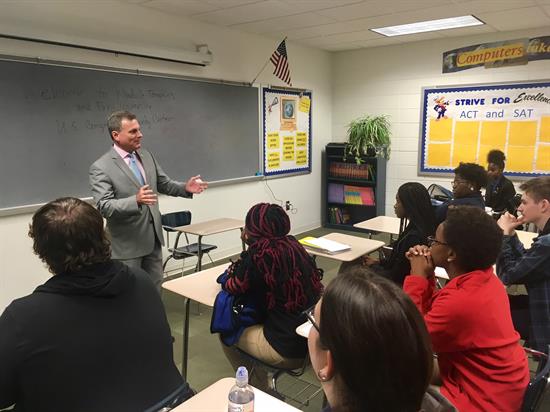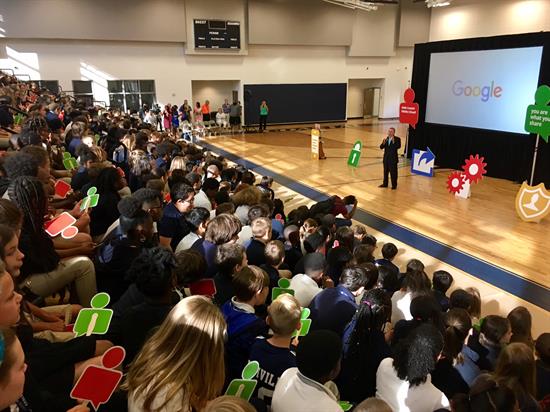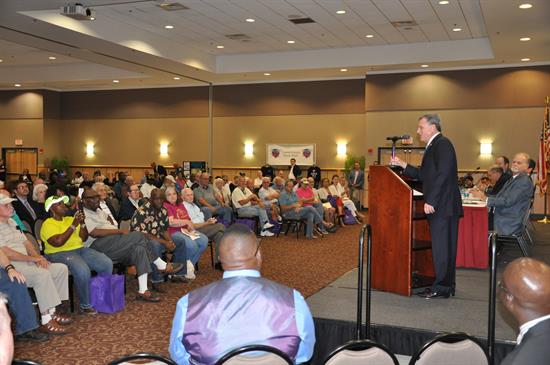|
|
|
|
Happy Mother's Day to all the incredible moms!
|
| What Happens to Me Under AHCA? |
|
|
The American Health Care Act (AHCA) has passed the House and is now under consideration in the Senate. Now that this legislation has passed the House, I want to share a document prepared by the Energy and Commerce Committee that I serve on to clear up any questions you may have about how the AHCA will impact your health care.
What Happens to Me Under the AHCA?
I receive health care coverage through my employer:
The vast majority of Americans receive their health care coverage through their employer. You, along with roughly 155 million Americans who receive health care coverage through their employer, are not directly affected by the AHCA.
I receive health care coverage through Medicare:
You, along with 44 million other Americans, will not see any changes to your health care coverage as a direct effect of the AHCA.
I’m a veteran or receive health care coverage through the military (Tricare, etc.):
You will not see any changes to your health care coverage as a direct effect of the AHCA.
I’m currently enrolled in traditional Medicaid:
Current enrollees will not see any changes to their health care coverage as a direct effect of AHCA through 2020. In 2020, the federal government would set a defined upper limit on the amount of money for which state Medicaid programs can receive matching funds to cover each person enrolled in a state’s Medicaid program. States will then each determine how much they will spend of their budgets on the program.
I receive health care coverage from Obamacare’s Medicaid expansion:
Your health coverage as an expansion enrollee is grandfathered and you will not see any direct effect to your health care coverage under the AHCA for as long as you remain eligible and enrolled. As your life circumstances change over time, you may eventually move to the individual insurance market, where a tax credit will help you purchase health insurance. Or you may eventually receive health care through your employer, other government programs, or through innovative programs established in your state and funded by the AHCA’s Patient and State Stability Fund.
I’m an adult under the age of 26 and do not have employer sponsored health care:
You remain eligible to receive coverage under your parent’s health insurance plan.
I purchase health insurance on my own in the individual insurance market:
You and your family are eligible for a monthly tax credit—between $2,000 and $14,000 a year—for purchasing private, quality coverage of your choice. Further, the AHCA establishes a $138 billion Patient and State Stability Fund to assist in providing coverage and lowering costs for patients. With this fund, states can establish high-risk pools, cut out-of pocket costs, establish innovative risk-sharing programs, participate in a federal risk-sharing program, and generally increase the number of health care options available to you.
I have a pre-existing condition:
Under our plan insurance companies are prohibited from denying coverage on the basis of a pre-existing condition, banned from rescinding coverage based on a pre-existing condition, and prevented from raising premiums on individuals with pre-existing conditions who maintain continuous coverage. In the rare circumstances for which a person may be charged more for a pre-existing condition, a person must:
• reside in a state with a federally approved waiver and a risk mitigation program;
• have a pre-existing condition;
• be uninsured because they have not maintained continuous coverage; and
• purchase health care in the individual market.
For these rare individuals, the AHCA provides $8 billion, specifically targeted to reduce the premiums and out-of-pocket costs, which is included in the $138 billion Patient and State Stability Fund to help provide coverage and lower costs for patients. With the Patient and State Stability Fund, states can cut out-of-pocket costs, establish innovative risk-sharing programs, participate in a federal risk-sharing program, and generally increase the number of health care options available to you.
I or someone in my family has a mental health condition or substance abuse issue:
The AHCA makes no changes to existing mental health and substance abuse parity laws, which ensure equal treatment of these conditions within insurance plans. The AHCA also provides $15 billion as part of the $138 billion Patient and State Stability Fund specifically targeted at helping states provide coverage for these conditions. |
| From our Nation's Capitol CXIII |
|
|
Monday, May 8, 2017: This morning I’m in Greensboro, Georgia, where, along with my fellow delegation member Rep. Doug Collins, I participate in a panel discussion at the Georgia Chamber of Commerce Board of Directors annual meeting.

Representatives Carter and Collins at the Georgia Chamber of Commerce Board of Directors meeting |
Rep. Collins and I deliver a federal affairs update and afterwards answer questions from the group of state business leaders regarding issues being discussed in Washington. Later in the afternoon, when I’m back in Savannah, I head to Memorial University Hospital where I participate in a health care panel at the annual meeting of the Merit Independent Physician Association. While I update the group on the American Health Care Act and answer questions from the floor, my good friend and successor in the Georgia State Senate, Sen. Ben Watson, gives an excellent update on the recently completed Georgia General Assembly session.
Tuesday, May 9, 2017: One of my favorite activities is speaking to students and sharing with them what a typical day is like as a Congressman. This morning I’m at Woodville-Tompkins High School in West Savannah speaking to the American Government class taught by my long-time friend, Jimmy Morel. This great group of young people is actively engaged and eager to learn and gives me confidence that our country is in fine hands with the upcoming generation. Afterwards, I head to my Savannah District Office where I meet with Donna Camacho and other representatives of the Alzheimer’s Association to discuss legislation dealing with this terrible illness that is now the most expensive disease in America. Next, I meet with a constituent who is advocating upgrading the Silver Star awarded to Charlie Johnson, a Korean War hero killed in action, to a Congressional Medal of Honor. After a meeting with a constituent to discuss the American Health Care Act, I have a phone interview with Atlanta Magazine to discuss the Thiokol Memorial Project, a project to honor the victims and families that were killed and impacted by this tragedy that occurred in Camden County in 1971. The plant was used to create munitions and trip flares for the Vietnam War and exploded when the trip flares caught fire, killing 29 people and injuring many more.

Congressman Carter with students at Woodville-Tompkins High School |
Afterwards, I have another phone interview, this time with the Savannah Morning News, to discuss the Omnibus spending bill that was passed last week which included $15 million for Hurricane Matthew repairs for the Coast Guard and will help the station at Tybee Island that received substantial damage. Later, I travel to the J. C. Lewis Primary Health Care Center in Savannah where I receive an overview by the staff before touring the facility. This great facility provides many needed medical services to underserved citizens in our community resulting in less emergency room visits saving taxpayer money and, most importantly, producing a much healthier population. Following another constituent meeting in the district office, I head to a meeting with the Savannah Area Realtors to discuss pending legislation as well as tax reform. I finish the day in Ludowici as the keynote speaker at the annual Long County Law Day. Along with other fine personnel, State Court Judge Jeff Arnold, Sheriff Craig Nobles and Clerk of Superior Court Sherry Long, provide Long County with a great law enforcement and judicial system that serves the citizens well.
Wednesday, May 10, 2017: Today, I start off at Coastal Middle School in Savannah where I participate in the Google Online Safety Roadshow, billed as the “driver’s ed of the Internet,” that includes tips for students on how to be safe and smart online.

Congressman Carter participates in the Google Online Safety Roadshow |
After addressing the students and emphasizing how important it is to be safe on the Internet, I go head-to-head against two of the students in seeing who can come up with the strongest password. Needless to say, I lost both times. Afterwards, I head to our Brunswick District Office where I have a series of constituent meetings, including one of my favorite groups, Paula Guy and other members of Salus Telehealth Partners, who have been and remain on the forefront of telemedicine. Later, I head to Ware and Clinch Counties for a blueberry distribution tour to see first-hand the devastation that a late freeze has had on this year’s crop. Among my stops are Cornelius Farms in Manor with Alex Cornelius, Cogdell Berry Farm in Cogdell with Russ Goodman and Georgia Berry Packing in Homerville with Randy Register and his brothers. Afterwards, I attend the visitation service for one of Waycross’s most influential citizens, Gus Karle, who was the inspiration behind Rice Yard.
Thursday, May 11, 2017: After a meeting with Colonel Marvin Griffin, commander of the Savannah District of the U.S. Army Corps of Engineers, to discuss the Savannah Harbor Expansion Project (SHEP) as well as other projects in the district, I head to the Armstrong Center for our Veterans Forum.

Congressman Carter hosts the third annual Veterans Forum |
This annual event gives our veterans an opportunity to talk about the issues they are struggling with as well as talk to health professionals and VA leaders who can help them navigate the system. Afterwards, I head down to St. Marys and Camden County where I tour the Coast Guard’s Maritime Safety and Security Team (MSST). This anti-terrorism team was established to protect local maritime assets in direct response to the terrorist attacks on September 11, 2001. After this great visit, I head to Kings Bay Naval Submarine Base where I am honored to be the keynote speaker at the annual Sea Services Awards Banquet held to recognize the performance of the military on the base.
Friday, May 12, 2017: My first stop today is to address the Leadership Southeast Georgia at their meeting at Memorial University Hospital in Savannah as I bring this group of business and civic leaders up to date on the American Health Care Act. Afterwards, I head to Richmond Hill for a meeting with members of the National Alliance of Forest Owners to discuss timber issues and pending legislation currently before Congress. Next, I head to Hinesville and Liberty County where I tour the Diversity Health Center led by their CEO Stephanie Jones-Theaker. With two locations in Hinesville and one in Ludowici, this is another example of the fine work that our community health centers do in our district. I end my day and week by greeting soldiers of the 15th Infantry Regiment of the 3rd ID at their annual ball at the Savannah Marriott Riverfront. |
|
|

